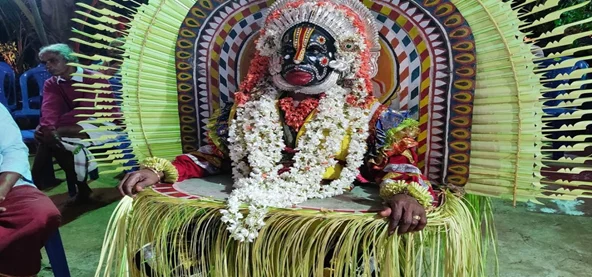History and Art and Culture
Context: Several complaints were filed in Karnataka over statements on a cultural practice called Bhoota kola depicted in the film Kantara.

About Bhoota Kola:
- Bhoota Kola is an annual ritual performance where local spirits or deities are worshipped.
- It is believed that a person performing the ritual has temporarily become a god himself.
- This performer is both feared and respected in the community and is believed to give answers to people’s problems, on behalf of the god.
- There are several ‘Bhootas’ who are worshipped in the Tulu-speaking belt of Dakshina Kannada, Uttara Kannada and Udupi districts.
- It is usually performed in small local communities and rural areas.
- As per Tulu Adivasi tradition, Bhoota Kola or Daiva Kola is a “non-Vedic” ritual where Bhootas or Daivas (guardians and ancestors) are worshipped.
- Idols representing ‘bhoothas’ are taken out in a procession to the beating of drums and bursting of firecrackers,
- It is widely believed these spirits protect the village from unfortunate incidents.
- A trained person performs this ritual.
- The dancing and pooja ritual is accompanied by drums and music.
- The performer carrying a sword and jingling bells imitates the ‘devil’.
Source: Indian Express
Previous Year Questions
Q.1) Which one of the following statements about Sangam literature in ancient South India is correct?
- Sangam poems are devoid of any reference to material culture.
- The social classification of Varna was known to Sangam poets.
- Sangam poems have no reference to warrior ethic.
- Sangam literature refers to magical forces as irrational.













